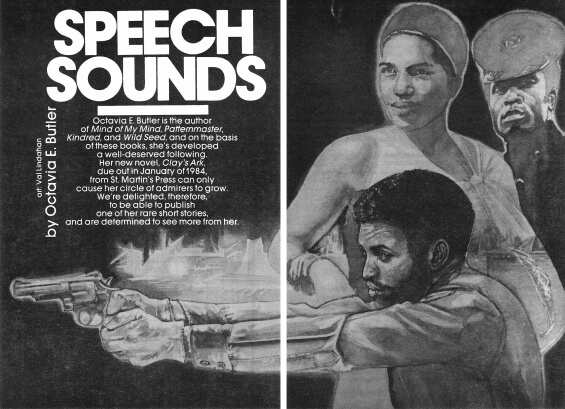
 The SFFaudio Podcast #415 – Jesse, Paul Weimer, Maissa, and Jenny Colvin discuss Speech Sounds by Octavia Butler
The SFFaudio Podcast #415 – Jesse, Paul Weimer, Maissa, and Jenny Colvin discuss Speech Sounds by Octavia Butler
Talked about on today’s show:
Asimov’s Science Fiction, Mid-December 1983, longer forms, the H.P. Lovecraft Literary Podcast, Bloodchild by Octavia Butler, the Patternist novels, the scene on the bus, Parable Of The Sower, Parable Of The Talents, Kindred, Sisters Of The Revolution, The Evening And The Morning And the Night, disease, bio Science Fiction, the virology labs, Xenogenesis trilogy, aliens, breeding humans, public transportation science fiction stories, Philip K. Dick, Los Angeles, The Commuter, Ray Bradbury, The Pedestrian, interacting with the public, The Chrysalids, The Day Of The Triffids, The Walking Dead, how this world got to be how it is, slowly interrogate, her central thesis: civilization = communication, how does the bus driver get paid?, what percentage of the population died?, a normal route, one guy is the bus system, how does Obsidian get paid?, paid in sex?, post-apocalypse reveling Jenny, the creepy smelly wordless cult leader, how many women could speak?, right handed men, feminism, creepy men creeping on women, play dumb and pack a gun, our zombies are different, unique special snowflake zombies, body language, was it the Soviets?, you think you’re better than me?, a perfect nightmare of Hell, the law of the jungle, Obsidian is mentally impaired, if there ever was going to be a TV adaptation they’d call it “The Silence”, au contraire, standing spear-carrier, a swapped languages Vietnam War movie [subsequent research turns up no evidence that this film exists], everyone else is an alien to everbody else in this world, romance as opposed to SF, not certain of her own impairment, memory, they just needed audiobooks, jibber-jabber speech sounds, it just meant nothing, dah dah dah, could you still speak?, when the deaf speak, if you can’t speak can you understand your own thoughts, strokes, aphasia, communication by singing, Oliver Sacks, the afterword, visiting her dying friend, popular science of the 1980s, a science fiction epidemic, being a lefty or a righty, the rage, so primal, primal instincts, you’re all hairless chimpanzees, pre-human, the one element of humanity is your name, book-cart or book-truck, books as fuel, cake or oven, a teacher and protector, Sisters of the Revolution: A Feminist Speculative Fiction Anthology edited by Ann and Jeff VanderMeer, it was language that turned her around, savouring the words, society in general, The Scarlet Plague by Jack London, The Iron Heel not the Iron Fist, limited intellect and language, the Red Death, life before the plague, the breakdown of society, pandemics empowering the lower classes, a liberation from the burden of history, chauffeur, taking on a harem, reconstructing the low being brought up, The Walking Dead, scavenging silently, a Garden Of Eden, so messy, blow it up and start fresh, divine retribution, like the Tower of Babel, bulldoze 2017 and start again, the toddlers are immune, the story is unfinished and we have to finish it for ourselves, the Rosetta Stone, deciphering Linear B (the language of the Minoans), how important illustrations are, Aztec and Mayan hieroglyphs, The Riddle Of The Labyrinth: The Quest to Crack an Ancient Code by , talking to other book people, Reading Envy isn’t Reading Rage, transcribing music without the western music notation system, what happens next?, the music analogy, a hopeful story, a hopeful ending, book people are focused on the reading, burned abandoned buildings, sex in public, highly depopulated, women seeking protectors, maybe he’d meet someone else, sadness, if this was a TV show, how would deaf people be affected?, isn’t sign-language simply another language, H.G. Wells’ The Kingdom Of The Blind, is the gesturing center the same as the speech center?, fMRI, Letters To [Octavia] Butler, Letters To Triptree, bias and prejudice, how can people think like this?, using words in ways they can’t be used, using words as gestures, Twitter as the aggressive gesture, big ideas in a short space, a conspiracy that’s happening (long names on Twitter), seeing metaphors everywhere.

Posted by Jesse Willis



